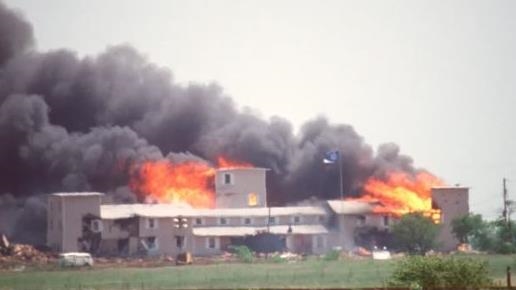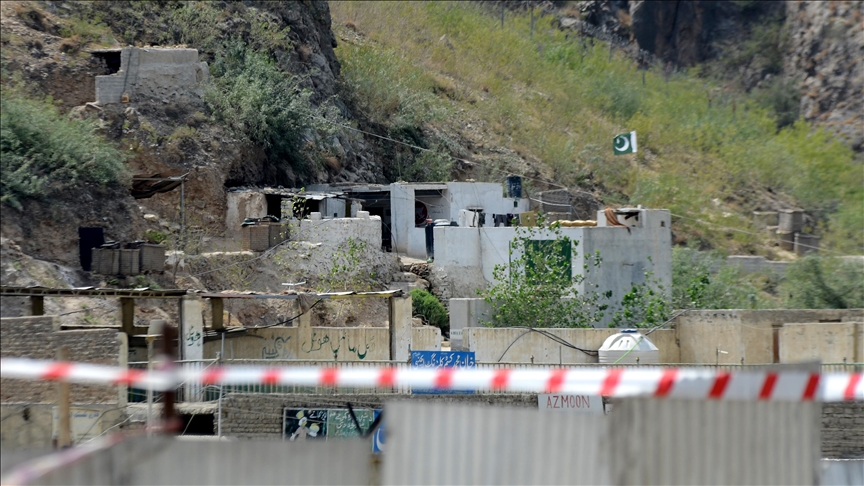US marks 30 years since deadly raid on Branch Davidian compound in state of Texas
HOUSTON, US
This week marks the 30th anniversary of the deadly standoff between US federal agents and the religious cult known as the Branch Davidians, where nearly 100 people died in what some critics call a massacre.
The ordeal began on Feb. 28, 1993 when agents with the Bureau of Alcohol, Tobacco and Firearms (ATF) tried to arrest the cult’s leader, David Koresh, at his religious compound in Mount Carmel, Texas just outside the city of Waco, which is remembered as the site of the incident.
During the initial confrontation, the ATF exchanged gunfire with the Branch Davidians, leaving four federal agents and six members of the religious group dead.
Government officials claimed the Branch Davidians opened fire first, a contention which surviving members of the religious group have denied for three decades.
“It’s easy to jump in and say ‘that was an egregious error,’ but it requires carefully examining the entire situation from both sides,” said Amos Guiora, a law professor at the University of Utah in Salt Lake City, and an expert on counterterrorism.
Guiora, who spoke to Anadolu in a phone interview, served 20 years in the Israeli army Judge Advocate General Corps and was the legal advisor to the Gaza Strip for three years, where he gave legal and policy advice to military commanders in dilemmas of operational counterterrorism.
“Nobody wants to see people get killed, but if a hostage situation goes on and on as it did at the Branch Davidian compound, at some point the commander is going to have to give the order to go in and take action,” said Guiora.
‘Religion no excuse for breaking the law’
The initial botched raid led to a 51-day standoff that transformed this rural community into the scene of a virtual war zone. The 77-acre compound was surrounded by tanks, armored vehicles, and some 600 federal agents including members of the ATF and the FBI as the world watched the conflict escalate.
While the general public may have viewed the situation as a violent standoff between the US government and a religious group, the ATF and FBI had collected evidence that the Branch Davidians were illegally stockpiling weapons and explosives at their headquarters and so wanted to arrest Koresh for unlawful possession of a destructive device and search the complex.
Critics have questioned whether the government crossed the line of the US Constitution’s first amendment right to religious freedom, but Guiora said religion cannot be used as a rationalization to conduct illegal activity.
“To use religion as an excuse or a basis or a rationale for anybody that may cause harm to others just doesn’t work at all,” he said. “Whether it’s Group A or Group B, freedom of religion is not absolute. If this group was using its articulation of a religion or culture to conduct illegal activity, then freedom of religion is not unlimited.”
“If there is potential harm to vulnerable individuals, the government is entitled to act even if outsiders see this as a violation of freedom of religion.”
‘A calculated risk’
Tragically, the events at the Branch Davidian complex unfolded violently on April 19 as Koresh delayed his surrender after more than 100 conversations with FBI negotiators. The government moved their tanks closer to the compound and began throwing tear gas inside the building. Amid the chaos, the complex caught fire and became engulfed in flames.
In the aftermath of the blaze, 75 people, including Koresh, were found dead, with records showing that 28 of those victims were children.
“Nobody wants to see innocent people killed, especially women and children,” Guiora stressed. “But sometimes in a situation like this that dragged on for nearly two months, a commander must make the decision to act, provided that the rules of engagement have been articulated and followed and every effort has been made to protect and shield the vulnerable.”
“It’s a totally awful predicament to be in and it’s a calculated risk for anybody who is involved in counterterrorism,” continued Guiora. “But the guiding principle is you want to minimize the loss of innocent life, target those bad actors who need to be targeted, and strategize and plan based on the knowns versus unknowns.”
The FBI managed to secure the release of 44 people from the complex during the course of the standoff before the deadly siege, according to the government.
While onlookers watched the terrible events unfold on television and critics called it a massacre, the government said it discovered the illegal weapons that led to the initial raid. A total of 250 weapons were found inside the complex, including semi-automatic rifles, assault rifles, an assortment of guns and revolvers, and hundreds of grenades, according to federal records.
“You can always unpack an operation in the aftermath and say ‘we could have done this or could have done that,’ but in this case, if the Branch Davidians were deemed to have violated relevant law, then it was absolutely right for the federal government to hold them accountable and act accordingly,” said Guiora.
Guiora said he is not surprised that a new TV miniseries based on the standoff, called WACO, is garnering attention all these decades later.
“There is a certain intrigue to monumental events like the Waco siege,” he said. “David Koresh may have been like some of the terrorists I have encountered who had a death wish for themselves and wanted to go out in a blaze of glory, as awful as that sounds.”
“People are curious. The public is interested, and that is relevant to Hollywood,” added Guiora. “This incident is marketable and sellable and makes sense from that standpoint.”
Anadolu Agency website contains only a portion of the news stories offered to subscribers in the AA News Broadcasting System (HAS), and in summarized form. Please contact us for subscription options.




